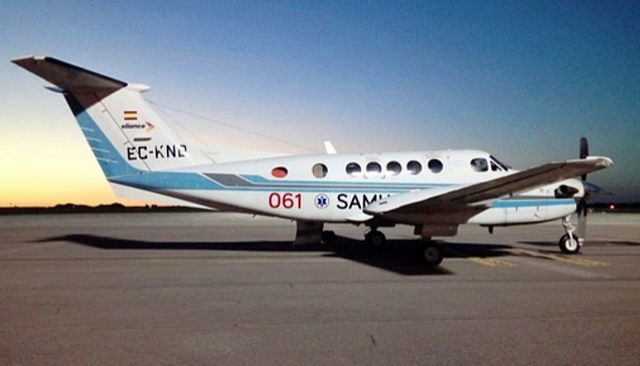The modern ambulance planes that the Government hired at the end of 2018 for 25 million euros have not come into operation. Instead, the winning company uses ships that do not meet the requirements of the contract and that exceed the maximum age allowed. The two medicalized planes contracted should have entered service on December 1, 2018 but almost a year later nothing is known about them, which is a serious breach of the contract called by the Department of Health. The news was unveiled yesterday by the Aviation Digital publication and could be subsequently confirmed by this means.
The Spanish Union of Airline Pilots (Sepla) explained yesterday to this media that various writings have been submitted to the Department of Health, which is chaired by the socialist Patricia Gómez, explaining the breach of the contract of both the health transport aircraft and the helicopters He has also requested explanations from the Government of the company that was second in the contest and lost it precisely because its planes were older than those of the winning company. In the end, the aircraft used are more than ten years old, which means a flagrant breach of the contract.
The contract of the two airplanes for sanitary transport was won by the joint venture formed by Habock Aviation Sl and Urgemer Canarias SL. This company offered two B250 planes. Instead, two older planes, the B200, are used. In the contest, the company that was in second place was Babcock, which had been providing the service during the last years and since the time of Inaer, another airline emergency company.
To assess the offers, five issues were taken into account and in three of them the two aspiring companies were tied. There was a tie in economic offer, in additional coverage during the holiday season and in flight hours. What tipped the balance was the age of the aircraft and training and the winner was the UTE led by Habock that offered the two B250 with a three and six year old age respectively.
In spite of all this, the contract is not fulfilled and the two airplanes that provide the service since the end of 2018 are 10 years old and 20 years old. Given this circumstance, the company that lost the contest, Babock, has submitted several writings to the Department of Health stating that, according to clause 7 of the Specification, the contract should be canceled. At the moment the Department of Health has not responded to these writings and is waiting to hold a meeting with the Sepla union.
David Abad, a spokesman for Sepla, confirmed to EL MUNDO yesterday that they had made several requirements to the Department of Health to explain the situation and that they were waiting to be summoned to a meeting that has already been promised. Abad commented that the B200 planes are not insecure but adds that they are not what the taxpayer is paying. They are airplanes with less power and endowments than the B250, apart from being older.
Abad comments that there are also problems with the helicopters of the air transport service and that the pilots themselves have reported a series of irregularities to the Sepla. Apparently, the pilots of these helicopters do not meet the requirements and training to do what are called intrumental flights, they are those where it is not necessary to have visual contact with the earth and that allows flying at night and in conditions of poor visibility, something very important for flights between islands. Helicopters probably have the right technology to perform instrumental flights but the pilots do not have the precise training. Another complaint of the Sepla is that neither the airplanes nor the helicopters that transfer patients have an incubator, which was a condition established in the contest.
In September 2017, the Ministry of Health announced the launch of the file for the new air transport health contest and made sure that the new ambulance airplanes will double their capacity and could transfer patients on a stretcher. As a great novelty it was said that the age criterion was modified and that while in the previous contest you could buy devices with more than 10 years, now the maximum age was fixed precisely in 10 years. As already said, neither of the two planes that cover the sanitary air transport service is less than ten years old. Sepla insists that the airplanes that are used have the maximum security but that they are not the ones that were hired.
The company that lost the contest, Habock, did not want to make statements about the conflict yesterday but acknowledged that it will have sent several writings to the Department of Health.
According to the criteria of The Trust Project
Know more- Balearics
GeologyCueva de Artà, laboratory of the past climate
Angiostrongylus cantonensis First detected in Mallorca the rat lung worm
MallorcaMatthias Kühn will not be able to open a rural hotel in the Genoa military magazine

